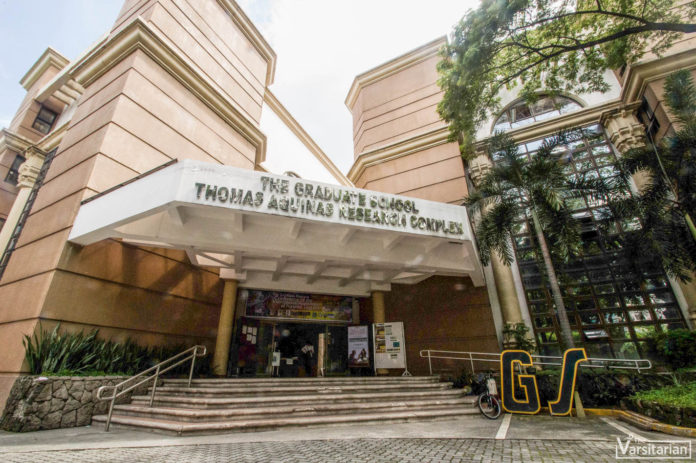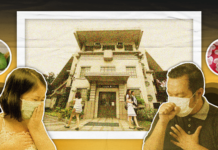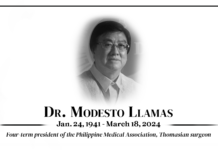PLANS are underway to upgrade facilities and services of the UST Psychotrauma Clinic to accommodate more people with the passage of a new mental health law.
The clinic also aims to constantly monitor therapies, interventions and assessment tools that are empirically-proven or endorsed by the World Health Organization, Rodel Canlas, a psychologist and counsellor in UST Psychotrauma Clinic told the Varsitarian.
“The Psychotrauma Clinic will continue to provide free counseling services and continue partnership with local organizations in delivering mental health services such as group interventions, lectures, seminar-workshops and trainings in the community level,” he said.
Last June 21, President Duterte signed the Philippine Mental Health Law or Republic Act 11036, a right-based law that guarantees every person’s right to mental health care.
According to the Philippine Council for Mental Health Research and Development, there is only one mental health professional for every 250,000 service users.
Under the Philippine Mental Health Law, patients with mental illness would no longer be called patients but “service users.”
Since the law seeks to increase the mental health support system and professionals from nationwide to the barangay or community level, the clinic’s services will not be limited inside UST but will include barangays as well, Canlas said.
“It (Psychotrauma Clinic) will be responsive to the deinstitutionalization component of the Mental Health Law—transitioning mental health services from the usual institutional facilities down to the community-based setting,” he said.
He also added that the clinic would continue to conduct researches on the cases that they handle such as adult and child trauma, anxiety and depression to contribute to the existing studies on psychological trauma and related conditions in the Philippines.
Stigma
Filipinos still have “a very strong denial” when it comes to being comfortable with mental health concerns, said Risa Hontiveros, the principal author of the Philippine Mental Health Law, during a mental health forum at the UST Medicine Auditorium last Oct. 16.
“Ginagamit ‘yong mga salitang baliw or abnormal as insults, ‘dadalhin kita sa mental’, o ‘ipasok na ‘yan sa Mandaluyong’, in reference to what is now the central institution for mental health,” she said.
She stressed that Filipinos should stop associating stigma to service users which could also demean those who work hard to help the latter.
Hontiveros said that there is also a “sore need” for mental health professionals in the Philippines.
“It is very important to remove smart-shaming. We should not embrace a culture of willful ignorance and instead replace it with one that is open to knowledge and understanding,” she added.
Hontiveros also explained that the Philippine Mental Health Law would provide an annual budget that would support psycho-social services in schools and establishment of small facilities by the local government units.
“Strengthening mental health at the community level through the implementation of the law is towards the better recovery of people with mental health concerns, who are part of the community,” she said.
Preventive suicide, safe spaces
Marc Reyes, a psychologist and associate professor from the College of Science, told the Varsitarian that students and faculty members should try to talk about suicide cases and their possible preventions, but should not just be reactive towards such incidents.
“We need to talk about suicide, but the problem is [that] students tend to be just reactive towards it. They only focus on the incident, not on the problem itself. After the incident, wala na,” he said.
He also noted that checking one’s genealogy or family history and acknowledging mental health concerns would be crucial as it could aware the person on the possibility of having severe mental disorders, or one which could lead to suicide.
Renz Argao, supervising psychologist of the UST Psychotrauma Clinic, said it would be helpful if faculties establish “safe spaces” in classrooms so students would be comfortable to learn, and such could prevent stress and anxiety build-up.
“Safe spaces are spaces where students can be who they are, say the [thoughts] they want to say, to uplift mental health,” said Argao during the mental health forum in UST.
Four out of 10 Thomasian service users could be symptomatic of conditions such as Post Traumatic Stress Disorder, anxiety and depression, the clinic’s records showed.
More females were reported to experience mental health concerns. As per the clinic, this could be because females would be more vulnerable to abuses, more susceptible to conditions that could lead to an actual disorder, and they simply were more likely to seek personal or professional help.
This year, the number of clients served by the Psychotrauma Clinic is more than 2,000.














